Gaming, Events and Beyond
- Mobile Games' Booming Market: Opportunity for Hollywood and IP Owners
- VR Gaming Grows Up at GDC 2017
- SXSW 2017: A Melting Pot of Tech, Brand and Creative Voices
- The Future of Sport—An eSports Epiphany
Mobile Games' Booming Market: Opportunity for Hollywood and IP Owners
By Ned F. Sherman
The mobile games market is growing at a record-breaking pace. The market reached a new high in 2016, generating more than $40.6 billion in worldwide revenue, up 18% from 2015. To put this in perspective, revenue generated by mobile games is now equal to all global movie box office sales during the same period, and mobile games now account for half of the entire global digital games market, according to a new report, "Can't Stop, Won't Stop: The 2016 Mobile Games Market" from SuperData Research and Unity Technologies. Make no mistake about it: mobile games are big business.
At the same time, competition in the mobile games market is fierce. There are more than 800,000 mobile games in the app stores compared to 17,000 titles available for all games consoles and PCs, all vying to be discovered. While the barrier to entry is still low, the marketing investment required for mobile games publishers is so high that small developers (except for a few notable successes—Crossy Road, Flappy Bird, Monument Valley) have not been able to compete. In fact, approximately 80% of mobile games revenue in the top 1,000 titles is earned by the top 20 publishers in each region, which means that tens of thousands of developers are fighting for the remaining 20% of revenue, according to research, "Mobile games: leading but less lucrative" from Deloitte Global. With so much competition, developers and publishers are increasingly turning to licensed intellectual property (IP) in hopes of gaining an advantage.
Games based on the IP of television shows, movies and books have existed for a long time, but the reality is that many of these games have been low quality, often driven by a desire for a quick financial return rather than creating quality gaming experiences. However, in the last few years, there has been a rise in commercially successful (i.e., top grossing titles in the app stores) mobile games based on licensed IP. Mobile games like Simpsons: Tapped-out, Kim Kardashian: Hollywood, Fallout: Shelter, Walking Dead: Road to Survival and Marvel Contest of Champions have had great commercial success and are breathing new life into the relationship between Hollywood, IP rights holders and the games industry.
This development raises the question: what impact does licensed IP have on the success of mobile games? The theory behind licensed games is that brand matters and, assuming all else is equal (the game is well-designed and captures the spirit and characters or the underlying IP), will provide an advantage when it comes to user acquisition by appealing to both existing and new fans. But not all brands are equal. There is an interesting study done by Finnish mobile game analytics company GameRefinery that attempts to measure the effect of licensed IPs on the commercial potential of mobile games. The study found that a strong licensed IP helped games that had the other characteristics of a successful game to turn them into very successful games. However, the study also pointed out that having a well-known IP alone is not enough to ensure commercial success, which also requires well-designed features, effective implementation and a sufficient user acquisition budget. If a game lacks these core elements, the IP alone can do little to salvage the commercial opportunity.
What does this mean if you are considering launching a mobile game? If you are an existing IP holder or game developer or publisher, there is a lot you need to know before entering the market to license IP for mobile game development. Which game developers and publishers should you be talking to and why? How do you structure the right deal that sets you up for commercial success without compromising the value of your IP? And how do you evaluate developer/publisher partnerships since each has its own culture and genre expertise? If you are a developer, what kind of IP makes the best mobile games? How do you identify IP with value that translates into success in the mobile games market? And perhaps most importantly, how do you educate and convince IP holders of the long-term value in creating quality gaming experiences as opposed to just focusing on the immediate financial return?
With the global market for mobile games expected to continue to grow, there are ample opportunities for both IP owners and game developers/publishers to forge successful long-term partnerships that grow the value of the underlying IP and bring commercial success. If you've been on the sideline, now is the time to get up to speed on this growing business.
Ned Sherman is counsel and director for Manatt Digital and has worked in the games industry for 20+ years as an advisor to games companies and founder/chair of LA Games Conference, NY Games Conference and Digital Entertainment World.
VR Gaming Grows Up at GDC 2017
This year's Game Developers Conference in San Francisco brought together leading gaming and virtual reality (VR) companies for a week of meetings, panels, demos and events. Manatt Digital hosted a meetup at Mourad near the convention center on Thursday night to wind down the week's activities with some good wine and conversation with digital industry executives. Reports that ticketed conference attendance dropped slightly from last year did not slow down the crowds in the surrounding coffee shops, restaurants and hotel lobby bars, as business folks from the industry planted and shuffled from seat to seat for meetings and networking. It was a busy week.
While the 2016 conference was focused on launching VR experiences with still-to-be-released devices, this year's conference shifted to more practical applications and learnings from those launches. The gaming industry has a leg up on conventional cinematic and narrative content for VR due to the interactive nature of gaming, but there is still much to be learned and shared amongst the creative and development community. Experiences like "Fantastic Beasts and Where to Find Them" on the Google Daydream and "Dear Angelica" on the Oculus Rift held presentations to discuss their approach and learnings. Facebook's Oculus installation gave convention-goers the opportunity to experience the new game "Robo Recall" in all its robot-destroying glory. Unity and Unreal both showcased the power of their game engines that have been fueling innovation in the space and beyond.
The week was noticeably quieter than last year in the convention hall. Last year's VRDC schedule on Monday and Tuesday was chock full of major announcements and presentations from leading game publishers, developers and platforms. For example, last year PlayStation VR announced the price of their system, while clarifying specs and requirements for game developers, months before PSVR was released to the public. This year was lighter on those types of big events, especially with a follow-up VRDC conference that just took place in November of 2016. Convention burnout may have lessened the need for attendance at the full GDC event this year. The other reality is that VR has become more mainstream after 2016 saw multiple devices reaching consumers for the first time.
I expect GDC 2018 to be a little noisier for VR with a large slate of content still being developed and headset makers working on new iterations of the hardware as we speak. The big push in 2017 will be around increased customer acquisition and monetization. The mobile, console and PC markets are still robust and I spoke with a number of independent game creators on various platforms that were excited about their opportunities to get great content in front of audiences. The mobile market is especially busy right now as developers and publishers vie to attract attention to their IP amongst a crowded and ever-growing supply of games and competing entertainment options. However, the ability to attract an audience on mobile, if executed correctly, provides a significant opportunity for a return on investment.
The atmosphere at GDC on the whole was full of energy and positivity during a whirlwind week. Everyone I talked to was bullish on the next wave of content and user experiences coming down the pike. From console and PC to VR and mobile, we're surrounded by innovative gaming content. The real challenge will be finding time to try it all.
SXSW 2017: A Melting Pot of Tech, Brand and Creative Voices
Every year, creative minds, deal makers and problem solvers gather in Austin for South by Southwest (SXSW) Interactive to discuss tech and cultural challenges facing their industries today and how to solve them. There are at least ten panels happening around the festival grounds in any given hour during the day. This year's recurring themes include challenges related to security and fake news, and opportunities in AI, connected things and cultural diversity. SXSW continues to expand, bringing under its umbrella more tech ventures across all industries, including food, fashion and health. Levi and Google revealed a connected jacket that transforms the fabric into a touch screen. In a panel focused on the future of health, panelists representing the innovation centers of the American Heart Association and other healthcare companies discussed the rise of virtual care and role of blockchain technology in enabling patient-owned data in the future.
The conference also highlights global innovations. From Brazil to Germany to Indonesia, countries around the world showcased their work in AR, VR, blockchain and other emerging technologies. In developing countries where advanced phones aren't as accessible, companies like Slingshot are deploying AR experiences in thousands of supermarkets around Asia. Devices like the one pictured below are installed in grocery aisles and recognize grocery items, deliver brand experiences and report brand engagement, including demographic information (using visual recognition).
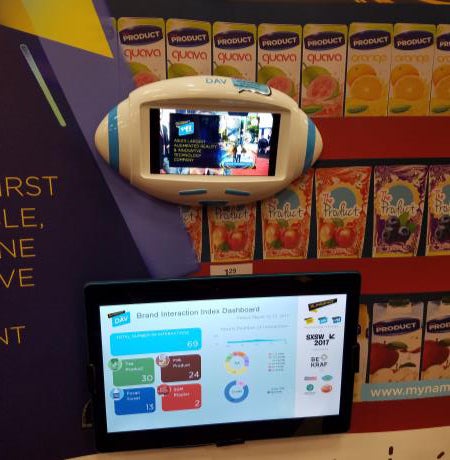
With immediate monetization opportunities for VR in location-based entertainment, we will see more experiences that sit somewhere in between going to a theater and going to a theme park. A group of Japanese companies including broadcaster NHK premiered the 8K VR ride, which takes 2 people through a tour of Tokyo and shows off the power of 8K technology.
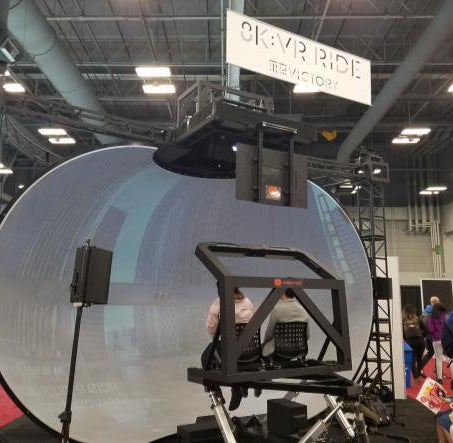
VR experiences abound in the conference hall from different types of companies. Home Depot's stand featured a VR game used for training employees, as well as an AR experience. AR headset maker Atheer showcased their productivity apps, which have been commercialized in the enterprise setting. Social impact organizations leveraging the empathy machine that is VR, were promoting their VR content, much of which is funded by Facebook or Google.
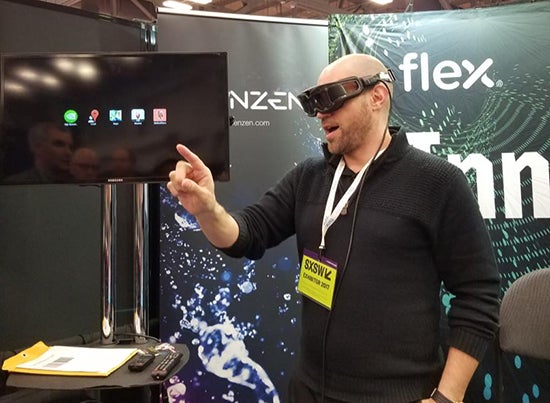
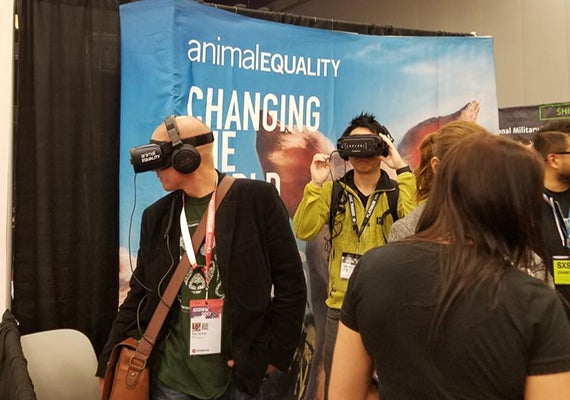
Outside the panels and conference halls, marketing activations attempt to cut through the noise by making more noise. Brands leveraged the amplifying power of social media with attention-grabbing, share-worthy marketing tactics. To promote its upcoming series The Handmaid's Tale, Hulu enlisted over a dozen women dressed as handmaids to silently walk around the streets of downtown Austin. TNT placed a pop-up beach in the middle of Downtown Austin to promote season 2 of Animal Kingdom.


When they weren't stopping foot traffic on the streets of Austin, brands kept users engaged and excited with interactive experiences indoors. IMAX and Universal debuted The Mummy's VR experience, which allowed users to simulate stunts with Tom Cruise in a zero gravity environment through a full-motion chair designed for cinematic VR.
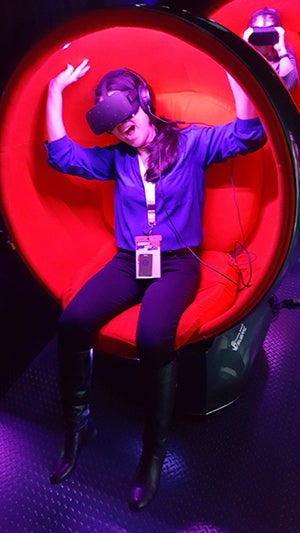
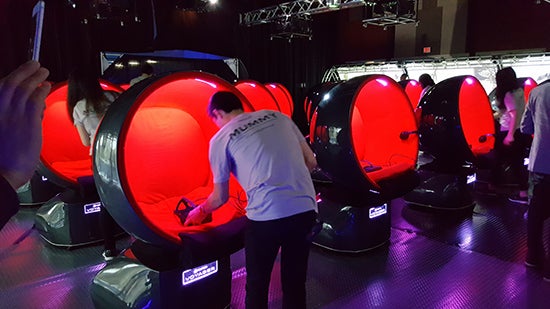
IBM's tech lounge included interactive experiences across multiple technology points, from security to smart homes to Watson (image below of connected furniture). After having a brief conversation with Watson about paintings and my family, Watson reported back to me what it thought my personality was like.

The last piece of SXSW is the dozens of corporate-sponsored events and lounges that take over many of Austin's hottest venues. CNN, which launched a dedicated VR unit recently, kicked off the weekend with amazing tacos and a couple of its VR experiences. Facebook, Pinterest and Twitter welcomed conference-goers to their "houses" where they showcased their latest platform features. Manatt Digital, along with our partners at CEC, Delta, Siemer Associates and BridgeBank, hosted our own event, bringing together tech and media executives, founders and investors.
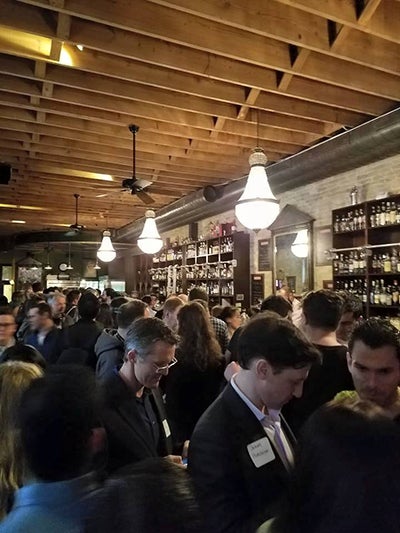
It's easy to be overwhelmed with 30 events on your calendar. But the best part about SXSW, regardless of where you end up spending your time, is the countless opportunities to learn from and connect with other SXSW attendees—those adopting new technologies or creative strategies to drive change in their organizations and industries—against the casual backdrop of Austin.
The Future of Sport—An eSports Epiphany
By Jordan Pritchett
Within the world of digital media, there are so many exciting segments that are collectively moving the ball forward in their own unique way, contributing to what can only be described as a consistent trend of exponential innovation. In terms of current examples, the options to choose from are vast. Take your pick. Whether it be the proliferation of immersive experiences as a next-gen interface, advancements in AI/machine learning or the diversification and ubiquitous nature of social media in general, these individual subsets all underscore an ongoing evolutionary trajectory that is significantly compounding the interconnected nature of human beings and the digital technology we create. And while there are multiple contributing facets to this progression, nothing exemplifies this trend and the shifting paradigm, at least in my eyes, as perfectly as the explosive growth that is occurring right now in the realm of eSports.
Having long been a point of discussion for our team here at Manatt Digital, eSports are an area of focus that we have spent considerable time examining. And while we make it our business to remain abreast on a substantial array of facts, figures and trends, it wasn't until fairly recently that I truly appreciated eSports' imminent future. As the saying goes, sometimes seeing really is believing.
For those unacquainted with the industry, the 2016 League of Legends World Championship was held in Los Angeles this past year at Staples Center. It is one of the biggest events of the year and boasted the fourth largest prize pool of 2016 at a cool $5.07 million. That being said, there was still a part of me that was unconvinced from an overall viability standpoint. For whatever reason, I had a hunch that the event would ultimately struggle to fill seats. I'm just being honest. It was Staples Center after all and, while I knew there was undoubtedly a passionate cadre of eSports fans out there, I was harboring doubts that the fandom had yet reached a level that was comparable to what I will term 'traditional' sports. I looked at the LoL Championship as a simple case study: Are eSports for real or not?
What I learned is that they are without question for real. My colleague Jake Carlson and I both purchased tickets to attend the finals event well in advance. This turned out to be a critical decision as it quickly sold out—in early August, which was well before the event was slated to take place at the end of October. Then some time in September a quick peak on StubHub revealed that ticket prices had surged to roughly 3X what we had originally purchased them for! It was in that moment that three things happened: 1) All my doubts regarding the legitimacy of eSports were quelled, 2) Jake and I might have stumbled onto a new side hustle, and—most importantly—3) I finally witnessed the voracious market appetite for these events firsthand.
Since that time, I am more convinced than ever that the most substantial opportunities are yet to come. As I see it, eSports are in the early stages of a coming of age moment, and they will only continue to become more ingrained into everyday life as technology and the human experience continue to converge.
Arguably the most telling sign that eSports are poised for dramatic growth can be found in the range of investment activity that is occurring. If you follow the money it reveals some important patterns. Certainly there are significant maneuvers that are taking place amongst your typical "institutional" heavyweights (such as BamTech's LoL licensing deal worth $300 million), but a much more attention-grabbing trend, in my estimation, is the flurry of investments that are taking place on the part of professional sports entities. TNL Media counts twenty one instances from roughly the past year where professional soccer, basketball and hockey teams have invested in the space. Furthermore, there is a growing list of former athletes who have also begun betting on this burgeoning industry. I expect that these organizations and individuals alike are attempting to get in on the ground floor of what they recognize as the next big opportunity in sports and will play an active role in applying their knowledge of the industry to help shape and grow its newest emergent digital category.
In its latest market forecast, Newzoo predicts that revenues for eSports will reach $696 million in 2017 and grow to $1.5 billion by the end 2020. While there are a number of factors that are driving this growth, I believe the most crucial to understand is the simple fact that the possibilities in this field are limitless. Where 'traditional' sports are bound by both the laws of physics and the extent of human athleticism, eSports are bound only by our ability to digitally create new constructs for competition. Furthermore, given our advancements in the realm of graphic rendering and immersive experiences alike, there may even come a day when our concept of 'traditional' sports amounts to nothing more than a detailed simulation. It is a mind boggling and frightening thought, but it is grounded in the simple truth that digital is the future. As such, the question then becomes not whether eSports should be considered sports, but rather how quickly will they come to supplant them?
